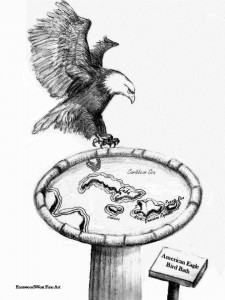Gossip From 1905
Posted in General on January 12th, 2012 by Eugene Finerman – Be the first to commentDid anyone miss me? If you are feeling neglected, blame Tsar Nicholas II, the Mikado Meiji and the editor who wanted me to write about the Russo-Japanese War. But even that war had its share of irony, and I would never begrudge you the gossip….
If the Russo-Japanese War had merely been a popularity contest, Japan still would have won. The newspapers of Britain and America depicted the conflict in terms of David and Goliath. It was earnest, energetic Japan against big, brutal Russia, and the stereotypes were actually correct. So what if the Japanese had started the war–or that the fight was over the possession of a prostrate Korea? If we had to pick a favorite vulture, it was definitely Japan. (Of course, no one asked the Koreans.)
The war began in February, 1904 with Japan’s surprise attack on the Russian naval base at Port Arthur. (Yes, the Japanese thought that the tactic would work a second time, too.) The Russians may have been surprised, but no one else was. In the preceding two months, American reporters were sent to Japan to cover the impending war. Apparently, no one in Russia read the Hearst newspapers, but when William Randolph demanded a war, the Mikado wouldn’t have dared refuse. However, the influx of American reporters caused a problem for the Japanese. A free press, even an ostensibly pro-Japanese one, could report casualties and setbacks. So the Japanese attempted to confine the American journalists to hotel bars and press releases. (That tactic has also been repeated.) A few reporters managed to evade their handlers and get to the front. Of course, the Japanese army was unhappy with the uncontrolled press. No doubt a few officers were prepared to arrange accidents–but really–many American journalists would have had fatal shaving accidents with samurai swords? The Japanese thought of a more adroit way to suppress the coverage. Cameras would be arrested for criminal activity. Reporters could write unfettered reports, but there would be no photographs for evidence—other than what the Japanese approved.
Russia’s humiliating defeat could be attributed to the imbecilic Tsar, his incompetent generals or his hapless admirals. But the Russia’s official scapegoat was the Jews. This seems surprising since very few of those generals and admirals were Jewish. However, it could have been an honest mistake. Mikado does sound vaguely Hebrew, one could easily confuse Rashomon with Rosh ha Shonah, and weren’t the Japanese always talking about their Sam and Murray Code?
